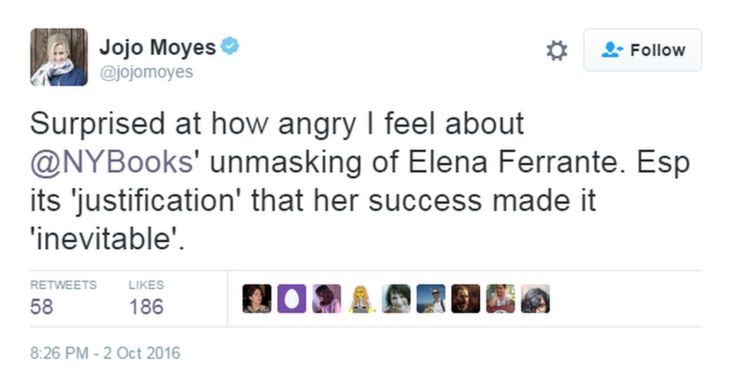We just think that this kind of journalism is disgusting
A woman novelist writes under a pseudonym. Her books sell. One of them is nominated for the Booker. So what has to happen next? A man has to rip away her pseudonymity, that’s what. The New York Review of Books, of all publications, has to help him do it by publishing his sleuthing work.
An Italian journalist who published the true identity of the “anonymous” author Elena Ferrante has said he did so because she is “a public figure”.
Claudio Gatti published a story in the New York Review of Books outing the author, who writes under a pseudonym, as Italian translator Anita Raja.
He said: “Millions of [Ferrante’s] books are bought by readers.
“In a way I think readers have the right to know something about the person who created the work.”
Bullshit. We may have the desire to know something about the writer, but a desire is not automatically a right. Just because we’re curious doesn’t mean we get to satisfy our curiosity, any more than Claudio Gatti’s throbbing erection would mean he gets to rape Elena Ferrante. His “justification” is just another “show us yer tits!”
Speaking to BBC Radio 4’s Today programme, he added: “I did it because she was a very much public figure.”
Bullshit again. A pseudonymous novelist is not a public figure. Some kinds of public figure should not hide their identities: people in government, banking, lobbying, corporations, that sort of thing – people who have real power over us. But novelists? Please.
Ferrante’s biography on the [Man Booker] Prize’s website reads: “Elena Ferrante was born in Naples. This is all we know about her… [she] has stayed resolutely out of public view.”
And that is her business, and not ours.
Gatti said he was able to identify her by the significant payments that had been made to her by the company, which appeared proportionate to the success of Ferrante’s books.
On Sunday evening, Sandro Ferri, Ferrante’s publisher and one of the few people who is known to know her identity, criticised Mr Gatti’s story.
In an interview with The Guardian, Mr Ferri did not deny Mr Gatti had correctly identified the author.
“We just think that this kind of journalism is disgusting,” he said. “Searching in the wallet of a writer who has just decided not to be public.”
It is disgusting, and it’s especially disgusting when it’s a man doing it to a woman. It’s a very ugly power play, and it’s all too rapey.
Several high-profile authors have also spoken out against the decision to publish the author’s real name.
JoJo Moyes, the author of Me Before You, was one of the writers to criticise the journalist in a series of tweets.
“Maybe Elena Ferrante has very good reasons to write under a pseudonym. It’s not our ‘right’ to know her,” Moyes tweeted.
Indeed it’s not.
Another writer who has spoken out is Bina Shah, who said what I was thinking:
Didn't Elena Ferrante have the right to her anonymity? Another woman stripped naked, metaphorically, by a man. https://t.co/xGjloQLx0v
— Bina Shah (@BinaShah) October 3, 2016
Didn’t Elena Ferrante have the right to her anonymity? Another woman stripped naked, metaphorically, by a man.
Precisely.
Salman Rushdie said on Facebook that all writers should do the I am Spartacus thing. I am Elsa Ferrante.


I am Elena Ferrante.
What? You mean…special little snowflakes might not have the right to do everything their little heart desires?
“In a way I think readers have the right to know something about the person who created the work.”
And in another–more accurate–way, no they goddamn don’t.
“In a way” is such a weaselly phrase. You can apply it to almost any absurdity. In a way, black is white. In a way, Trump is quite humble. In a way, the prose of Jacques Derrida is quite penetrable…